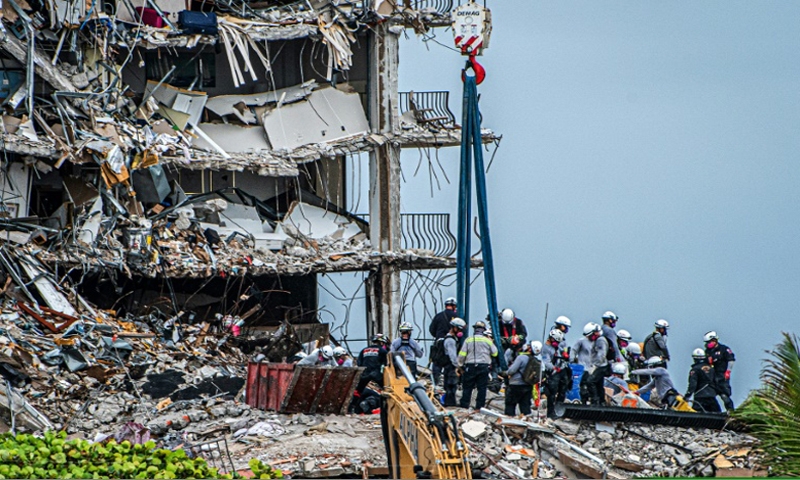'Just beside themselves': clergy, counselors fight grief at Florida collapse

Just days ago, Catholic priest Juan Sosa was ministering to parishioners and visitors at his Surfside, Florida church.
Now he wonders how many of them may be buried in the mound of rubble that the 12-story Champlain Towers South collapsed into, plunging his church and the rest of the oceanside community into mourning as a lengthy search process entered its seventh day Wednesday.
"They're just beside themselves because they knew some of the members, of course. They're very affected," he said, estimating that between 18 and 22 -- or more -- of his regulars are missing.
As for the relatives whom Sosa has spoken to of the 16 people confirmed dead, "You just have to listen to them," he told AFP.
"There's nothing to converse at the moment. Just listen and be with them."
With more than 140 people still unaccounted for and no survivors found since the immediate aftermath of the beachfront building's sudden collapse in the early hours of Thursday, Surfside, population 5,725, is hoping for a miracle -- but steeling itself for grim news.
Rescuers from across the United States and as far away as Israel and Mexico are combing through the mass of debris left behind by the cave-in, as counselors and clergy work with relatives of the victims to help them process the disaster that has turned their lives upside down.
"They're in a sense of limbo and that's going to be one of the most dangerous times psychologically for what people can experience," said Raphael Poch, a psychotrauma counselor who came from Israel alongside a search-and-rescue team.
- Few answers -
When disaster strikes in Florida, it usually comes during the yearly hurricane season, and building collapses are uncommon in the United States overall.
While speculation has focused on whether a lack of maintenance caused the destruction, there are no answers yet on the event's precise trigger, nor an explanation for the families of those who have disappeared -- rescuers are only finding a handful of bodies each day, and sometimes just one.
Poch, who has responded to disasters worldwide, said counselors have found it useful to interview families or find other ways for them to assist with the response, both to aid rescuers' work and also to give them something to focus on amid the uncertainty.
"That's giving them the sense that they're not helpless, that they're helping the situation," Poch said.
"And that's very, very important in preventing severe psychological reactions, which can happen afterwards if the senses of helplessness and loneliness are allowed to just continue unchecked throughout the limbo process."
Details like where someone tended to sleep and how they laid out their apartment have helped rescuers create a three-dimensional map of the rubble, which they're using to direct their search. The information has also helped narrow down the list of who may be trapped.
But with rescuers conceding that there's little evidence of life under the pile of concrete and rebar, counselors are girding for mourning.
We're "still trying to keep families fixated on their faith and remain hopeful and to begin to prepare people for what could be," said Ryan Saunders, a priest at a Miami church that is missing three parishioners who were staying at a friend's apartment in the building.
As the search goes on, Saunders said he and other priests expect to attend funerals and be with relatives as they grieve in the weeks to come.
"That, I think, does help bring a sense of closure, but at the same time, families will feel voids for years to come," he said.
facebook sharing buttontwitter sharing buttonmessenger sharing buttonwhatsapp sharing buttonsharethis sharing button.
